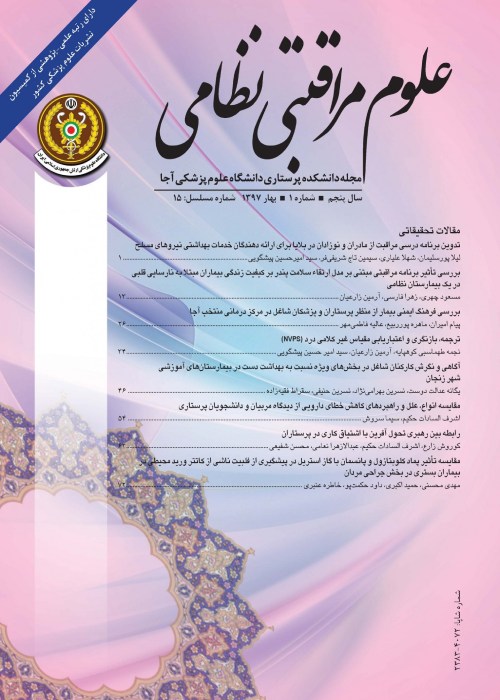The Effectiveness of Family-Centered Empowerment Model on the Treatment Adherence of Patients with Type II Diabetes and Heart Disorder Admitted to AJA Hospitals, During Year 2015
Author(s):
Abstract:
Introduction
Training of patients with diabetes and heart disease is a major problem in achieving optimal adherence to the treatment regimen. One of the most influential factors is selecting an appropriate teaching method. On the other hand, focusing on proper education for the patients family could facilitate the desired management and better control of the disease.Objective
The aim of this study was to investigate the effect of the family-centered empowerment model on treatment adherence in patients with type II diabetes and heart problems.Materials And Methods
This study was a clinical trial, in which 62 patients with type II diabetes and heart disorders were selected from AJA hospitals, during year 2015. In order to collect data, a demographic questionnaire, treatment adherence in chronic diseases questionnaire, and empowerment questionnaire, with parameters HBA1C and LDL were used. All questionnaires were handed over and filled in by 2 groups, before and after the intervention; the treatment adherence in chronic diseases questionnaire was handed over and filled in 4 weeks after the intervention. The data was analyzed using the SPSS version 21 software and chi-square test, Fishers exact test, independent sample t test, paired sample t test, and repeated measures analysis (ANOVA).Results
No significant differences was found in demographic factors between the two groups before the intervention (P>0.05). There was no statistically significant difference in the mean scores of empowerment of patients and family members, knowledge, treatment adherence in chronic diseases, and the mean value of HBA1C and LDL before the intervention (P>0.05), yet after the interventions, a statistically significant difference was observed between the variables (P0.09). The coefficient of variation showed that the reduction of LDL was greater in the intervention group than the control group.Discussion and
Conclusion
The findings showed the positive effects of the implementation of family-centered empowerment model to increase treatment adherence in the patients. Given the important role of the family in the management and control of chronic diseases, including type 2 diabetes and its complications, especially heart disease, using this template to achieve biologically optimal adherence is recommended.Language:
Persian
Published:
Journal of Military Caring Sciences, Volume:4 Issue: 1, 2017
Pages:
58 to 69
magiran.com/p1703788
دانلود و مطالعه متن این مقاله با یکی از روشهای زیر امکان پذیر است:
اشتراک شخصی
با عضویت و پرداخت آنلاین حق اشتراک یکساله به مبلغ 1,390,000ريال میتوانید 70 عنوان مطلب دانلود کنید!
اشتراک سازمانی
به کتابخانه دانشگاه یا محل کار خود پیشنهاد کنید تا اشتراک سازمانی این پایگاه را برای دسترسی نامحدود همه کاربران به متن مطالب تهیه نمایند!
توجه!
- حق عضویت دریافتی صرف حمایت از نشریات عضو و نگهداری، تکمیل و توسعه مگیران میشود.
- پرداخت حق اشتراک و دانلود مقالات اجازه بازنشر آن در سایر رسانههای چاپی و دیجیتال را به کاربر نمیدهد.
In order to view content subscription is required
Personal subscription
Subscribe magiran.com for 70 € euros via PayPal and download 70 articles during a year.
Organization subscription
Please contact us to subscribe your university or library for unlimited access!



